Introduction
CMS has taken extensive measures to assist providers and promote access to care in light of the Public Health Emergency (PHE) related to the COVID-19 pandemic. The efforts taken have and continue to benefit providers and patients across the country, however, the influx of information and the pace at which CMS releases it can be overwhelming. As a result, Polsinelli has compiled a list of frequently asked questions and answers related to CMS waivers and flexibilities around reimbursement, coverage, and billing. Key topics include originating site fee, telehealth services, specimen collection and modifier use, among others. This guidance is current as of the date of this newsletter. As guidance is still shifting, we encourage providers to confirm nothing has changed prior to relying on the below.
Telehealth
When is it appropriate to report the Originating Site facility fee code Q3014?
HCPCS code Q3014 describes the Medicare telehealth originating sites facility fee. A hospital may bill the originating site facility fee when a physician who typically furnishes care in a hospital outpatient department furnishes telehealth to a registered outpatient of the hospital The code is appropriate when: (1) the patient is a registered outpatient, and (2) the service is furnished in the hospital or a providerbased department of the hospital.
As a result of the PHE the provider-based rules have been waived. Therefore, any location, including a patient’s home, that is registered as a provider-based department is considered appropriate for meeting the condition that the service must be furnished in the hospital. If the service is furnished in the hospital and the patient is a registered outpatient it is appropriate to bill Q3014, the originating site facility fee.
What place of service (POS) code and modifiers should providers/suppliers use for telehealth claims?
Practitioners providing the professional component of telehealth services during the PHE should use the POS code that they would have otherwise reported had the service been furnished in person. Modifier 95 should be appended to all PHE telehealth claims.
Modifiers Related to Waivers
When is it appropriate to use condition code “DR?”
The DR condition code is required on all claims where Medicare payment is based on the presence of a formal waiver. The DR code is for institutional providers only and must be used at the claim level when all of the services/ items billed on the claim are related to a COVID-19 waiver. If an institutional provider is receiving payment from Medicare due to a formal waiver issued as a result of the PHE, and all of the services billed are related to the waiver, the DR condition code should be applied to the claim. Medicare will not deny claims if the DR code is present but used inaccurately. Note: The DR condition code is not for telehealth services, even if those services are related to a COVID-19 waiver.
When is it appropriate to use modifier “CR?”
Similar to the DR condition code, the CR modifier is mandatory where Medicare payment is based on a formal waiver. However, unlike the DR condition code, the CR modifier is used by both institutional and noninstitutional providers to identify Part B line item services/items that are related to a COVID-19 waiver. Medicare will not deny claims due to the presence of this modifier for services/items not related to a COVID-19 waiver. Note: The CR modifier should not be used for telehealth services, even if those services are related to a COVID-19 waiver.
When is it appropriate to use the “CS” modifier?
The CS modifier should be used by outpatient providers, physicians, and other providers and suppliers that bill Medicare Part B for COVID-19 testing related services. The services include: (1) Services that result in an order for or administration of a COVID-19 test, (2) Services that are related to furnishing or administering a COVID-19 test, or (3) Services for evaluation of an individual for purposes of determining the need for a test. Medicare beneficiaries should not be charged any co-insurance and/or deductible for these services. The CS modifier does not apply to inpatient services.
COVID-19 Specimen Collection and Testing
Can hospitals bill Medicare for the specimen collection fee (G2023 and G2024)?
Hospitals cannot bill using HCPCS codes G2023 or G2024, but there are limited instances when hospitals can perform and bill for specimen collection. G2023 and G2024 are used by independent laboratories to bill for specimen collection by trained laboratory personnel collecting samples from either homebound or non-hospital Part B inpatients (e.g., Part B SNF stay). Medicare also pays a travel allowance to laboratories performing specimen collection.
Hospitals may perform specimen collection using personnel appropriately qualified under state law, and are doing so at main hospital locations, temporary expansion locations, and drive-thru testing sites. During the PHE, hospitals may bill for the specimen collection services as hospital outpatient services with new code C9803. Consistent with Medicare Outpatient Prospective Payment System (OPPS) policy, Medicare will only make a separate payment to the hospital for the specimen collection if it is furnished as a standalone service (i.e., not furnished with more significant services in the same encounter) or if it is furnished only with a clinical diagnostic laboratory test. Specimen collection related to Part A inpatient stays would be covered and paid for as part of the hospital’s IPPS payment and there would be no separate collection reported.
Can hospitals and other non-lab provider-types bill Medicare for COVID-19 testing and, if so, what CPT/ HCPCS codes should we use?
CMS guidance related to who can bill for COVID-19 testing itself has been complicated and we recommend seeking guidance as to whether your entity can perform and bill for COVID-19 testing and, if so, what CPT/HCPCS codes should be used.
In general, Medicare payment is available for COVID-19 testing performed by an entity that is (1) certified by CLIA, (2) licensed under state law to perform lab tests, if required, and (3) enrolled in Medicare as a provider or supplier qualified to bill for lab tests. For CLIA certification purposes, laboratory testing is divided into three categories: (1) waived tests, (2) tests of moderate complexity, and (3) tests of high complexity. There are a variety of COVID tests available in the market, and each test authorized for use by the FDA falls within one of those categories. To perform a particular test, an entity must be CLIA certified to perform the appropriate level of testing.
Assuming an entity meets the above requirements in order to bill for COVID19-related testing, determining the appropriate CPT/HCPCS code depends on the type of test used. In general, Medicare pays for outpatient COVID-19 laboratory tests based on the Clinical Laboratory Fee Schedule. While pricing for some tests varies based on jurisdiction and is set by the MAC, through a CMS Ruling, CMS has decided to pay a uniformly higher amount ($100) for COVID-19 diagnostic tests involving “high throughput machines,” meaning a testing platform that processes more than 200 specimens per day. CMS has created special codes to identify these tests, U0003 and U0004. Other codes are available for testing that does not use high throughput machines, including, but not limited to:
-
87635 (Infectious agent detection by nucleic acid (DNA or RNA); severe acute respiratory syndrome coronavirus 2 (SARS-CoV-2) (Coronavirus disease [COVID-19]), amplified probe technique);
-
86769 (Antibody; severe acute respiratory syndrome coronavirus 2 (SARS-CoV-2) (Coronavirus disease [COVID-19]));
-
86328 (Immunoassay for infectious agent antibody(ies), qualitative or semi-quantitative, single step method (e.g., reagent strip); severe acute respiratory syndrome coronavirus 2 (SARS-CoV-2) (Coronavirus disease [COVID-19])); and
-
87426 (Infectious agent antigen detection by immunoassay technique, qualitative or semi-quantitative, multiple-step method; severe acute respiratory syndrome coronavirus (eg, SARS-CoV, SARS-CoV-2 [COVID19]).
Can we bill for COVID-19 testing and, if so, what CPT/HCPCS codes should we use?
CMS guidance related to who can bill for COVID-19 testing itself has been complicated and we recommend seeking guidance as to whether your entity can perform and bill for COVID-19 testing and, if so, what CPT/HCPCS codes should be used. Medicare will pay for COVID-19 testing performed by any entity that is (1) certified by CLIA, (2) licensed under state law to perform lab tests, if required, and (3) enrolled in Medicare as a type of provider or supplier to bill for lab tests. For CLIA certification purposes, laboratory testing is divided into three categories: (1) waived tests, (2) tests of moderate complexity, and (3) tests of high complexity. There are a variety of COVID tests available in the market, and each test authorized for use by the FDA falls within one of those categories. To perform a particular test, an entity must be CLIA certified to perform the appropriate level of testing.
Assuming an entity meets the above requirements in order to bill for COVID19-related testing, determining the appropriate CPT/HCPCS code depends on the type of test used. In general, Medicare pays for outpatient COVID-19 laboratory tests based on the Clinical Laboratory Fee Schedule. While pricing for some tests varies based on jurisdiction and is set by the MAC, through a CMS Ruling, CMS has decided to pay a uniformly higher amount ($100) for COVID-19 diagnostic tests involving “high throughput machines,” meaning a testing platform that processes more than 200 specimens per day. CMS has created special codes to identify these tests, U0003 and U0004. Other codes are available for testing that does not use high-throughput machines, such as:
-
87635 (Infectious agent detection by nucleic acid (DNA or RNA); severe acute respiratory syndrome coronavirus 2 (SARS-CoV-2) (Coronavirus disease [COVID-19]), amplified probe technique);
-
86769 (Antibody; severe acute respiratory syndrome coronavirus 2 (SARS-CoV-2) (Coronavirus disease [COVID-19])); and
-
86328 (Immunoassay for infectious agent antibody(ies), qualitative or semi-quantitative, single step method (e.g., reagent strip); severe acute respiratory syndrome coronavirus 2 (SARS-CoV-2) (Coronavirus disease [COVID-19])).
RHCs and FQHCs
Can RHCs and FQHCs bill for online digital evaluation and management services? What are the rates?
Yes, RHCs and FQHCs can bill for online digital evaluation and management services using HCPCS code G0071. The new payment rate is $24.76, effective March 1, 2020.
Hospital/Skilled Nursing Facilities (SNF)
Is additional payment available to hospitals that render care to SNF patients, requiring care at less than an acute level, that are unable to be transferred to a SNF due to the COVID-19 emergency?
Yes. If the initial patient admission was appropriate for Part A payment, Medicare will pay the DRG rate and any outlier costs for the entire stay until the patient can be moved to an appropriate facility.
Accelerated and Advanced Payments:
When will recoupment begin for the Accelerated and Advance Payment (AAP) program?
Typically, recoupment of AAP payments will begin 120 days after issuance of the payment. The repayment timeline depends on provider type, however, with inpatient acute care hospitals, children’s hospitals, certain cancer hospitals and critical access hospitals having one (1) year to repay the balance, and all other providers/suppliers having 210 days to repay. Repayment of the AAP amounts will happen automatically through a claims recoupment process. Thus, for a hospital, the MAC will begin offsetting claims payments to recoup the AAP amounts starting at 120 days from issuance. One year after the AAP issuance, the MAC will determine what amounts remain, if any, and will send a letter seeking direct payment of any remaining amounts, if necessary.





 i
i


